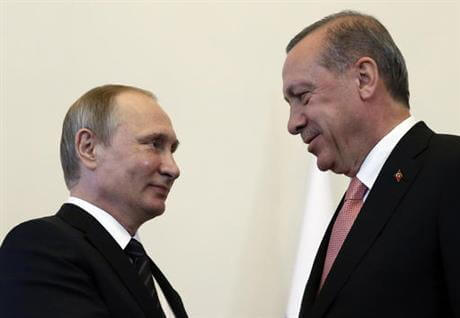
By IRINA TITOVA and VLADIMIR ISACHENKOV
Turkish President Recep Tayyip Erdogan said Tuesday after talks with Russia’s President Vladimir Putin that the two nations can rebuild their damaged ties and make them even closer, promising to back major energy projects with Russia.
Repeatedly calling Putin his “dear friend,” Erdogan said Turkey is ready to implement a natural gas pipeline project proposed by Moscow and a deal for Russia to build Turkey’s first nuclear power plant.
Putin, in turn, said the flow of Russian tourists to Turkey, halted after the downing of a Russian jet by Turkey in November, will resume soon. He also promised to gradually lift an embargo on imports of Turkish agricultural products and other restrictions.
Putin added that he and Erdogan would have a separate discussion on Syria later Tuesday involving top military and intelligence officials to search for common ground in the crisis, where Moscow and Ankara have backed the opposing sides.
by TaboolaMore from AP
Smuggling surges in Greece as migrant frustrations grow
Turkey: US shouldn’t ‘sacrifice’ alliance over Muslim cleric
While Moscow has backed Syrian President Bashar Assad throughout the nation’s civil war and further bolstered that support by launching an air campaign last September, Turkey has pushed for Assad’s removal.
Previously close ties between Moscow and Ankara broke down after a Turkish jet shot down a Russian warplane at the Syrian border, an incident that Putin had described as a “treacherous stab in the back.” Relations remained at a freezing point for seven months until Erdogan met the Russian demand for an apology over the incident.
Putin then ordered his government to start rebuilding ties with Turkey, and when Erdogan faced a botched coup attempt on July 15 the Russian leader quickly offered his support.
Erdogan particularly mentioned Putin’s gesture, saying it “gladdened me, my colleagues and our people.”
Analysts say that Erdogan may now be hoping to play the Russian card to strengthen his hand in disputes with the United States and European Union.
Turkey is pressing the United States hard to extradite Turkish cleric Fethullah Gulen, whom the government blames for the failed coup. Gulen denies the claims.
The dispute has strained U.S.-Turkish ties, with some Turkish officials implying the U.S. could have been behind the coup. Washington has denied that.
Speaking after the talks with Putin, Erdogan reaffirmed his claim that Gulen was behind the coup but didn’t touch on Ankara’s demand for his extradition.
The failed coup saw renegade Turkish military officers using jets, helicopters and tanks to try to take power in a night of violence that left more than 270 people dead. Since then, about 18,000 people have been detained or arrested and nearly 70,000 people suspected of links to Gulen have been suspended or dismissed from the civil service, judiciary, education, health care and the military.
European officials and rights groups have expressed concern over the crackdown — statements that have vexed Turkish authorities. Ankara has accused the West of failing to show due support for a democratically elected government.
In contrast, Erdogan praised Putin for offering his support after the coup and said that “we are strongly determined to take our relations to the pre-crisis and even higher level.”
Putin responded in kind, saying that “higher interests of our peoples, our nations require the restoration of our relations.”
___
Isachenkov reported from Moscow. Suzan Fraser in Ankara and Nataliya Vasilyeva in Moscow contributed to this report.
Discuss this story on Twitter or Facebook
@AP on TwitterAP on F



